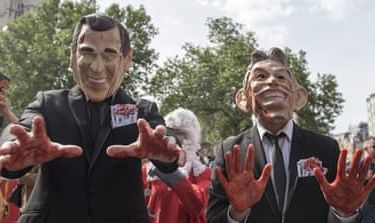Critics respond to inquiry on UK role in Iraq War
Labour leader Jeremy Corbyn suggests parliamentary action against former PM Tony Blair for Iraq War.

Critics of the United Kingdom’s role in the United States-led invasion and occupation of Iraq have spoken out in the wake of a report that concluded Britain joined the war on “flawed intelligence”.
The Iraq Inquiry, which took seven years to prepare and totals some 2.6 million words, was headed by retired civil servant John Chilcot.
|
|
“Military action in Iraq might have been necessary at some point, but in March 2003, there was no immediate threat from [then Iraq President] Saddam Hussein,” Chilcot said.
Former UK prime minister Tony Blair defended his decision to participate in the invasion, saying that he took “full responsibility” for it.
Jeremy Corbyn, leader of Blair’s Labour party, suggested parliament should take action against the former prime minister for misleading it in the lead up to the invasion.
“It’s led to a fundamental breakdown in trust in politics and in our institutions of government. The tragedy is that while the governing class got it so horrifically wrong, many of our people actually got it right,” Corbyn said, referring to massive anti-war demonstrations at the time.
READ MORE: The UK’s role in the run-up to ruinous Iraq War
Corbyn also proposed a war powers act to provide expanded parliamentary oversight on future UK military actions. He also called for the use of drones to be subject to parliamentary scrutiny.
‘No significant reform’
Legal experts and human rights groups also spoke out following the report’s release.
Rebecca Moosavian, a senior lecturer at Northumbria University’s School of Law, said future prime ministers “will continue to exert major influence over taking the country to war” because no “significant reform to the war power” since the Iraq invasion.
The Iraq war strengthened parliamentary involvement in warfare decisions by requiring the prime minister to obtain approval for military action, Moosavian told Al Jazeera.
READ MORE: Chilcot report – Tony Blair in focus ahead of launch
“However, Iraq also shows that this brake on war may be limited by factors including strong party discipline among MPs and, crucially, governmental control of the information on which parliament decides.”
In a statement released on Wednesday, Amnesty International said the UK should comply with international investigations into alleged unlawful killings and torture carried out by British troops during the war.
“Wherever there is sufficient admissible evidence, those suspected of criminal responsibility – no matter their rank or position – must be prosecuted in fair trials, while victims and their families must receive full reparation,” said Salil Shetty, the rights group’s secretary general.
“The UK must also fully cooperate with the International Criminal Court’s preliminary examination into alleged crimes by UK nationals in Iraq from 2003 to 2008, including murder, torture and other ill-treatment.”
Speaking in London on Wednesday afternoon, Blair said: “There were no lies, there was no deceit.”
Unanswered questions
Donald Campbell of Reprieve, a UK-based rights organisation, said the Iraq Inquiry left unanswered questions about the depth of British involvement in torture unanswered.
“It doesn’t get into [torture],” he told Al Jazeera. “That demonstrates to an even greater extent that we still need a full inquiry into British involvement in torture.”
In the lead-up to the invasion, former US Secretary of State Colin Powell said Saddam Hussein’s government was supporting al-Qaeda – a claim later revealed to be extracted through the torture of Libyan detainee Sheikh Ibn al-Libi.
Blair also repeated Powell’s claim to British MPs, saying in February 2003 that there was “unquestionably” a link between al-Qaeda and the Iraqi government.
Shaker Aamer, a former Guantanamo Bay prisoner who has been released to his home in London, has since said that British personnel were present during Libi’s interrogations.
Campbell explained that an inquiry into UK involvement in torture moved at a snail’s pace, and was later shelved and eventually handed over to the parliament’s Intelligence and Security Committee (ISC).
“The whole problem with the ISC is that it’s a very secretive body and, in many ways, quite heavily under government control,” he said. “But there are strong indications that there was political knowledge [of torture].”
Additional reporting by Shafik Mandhai: @ShafikFM
|
|